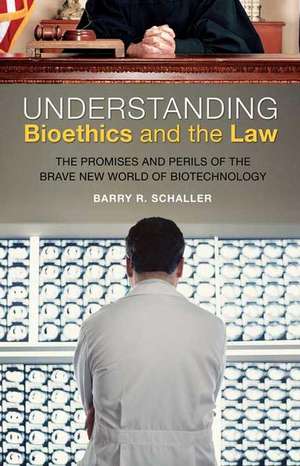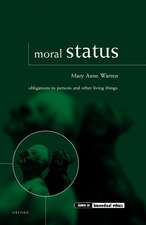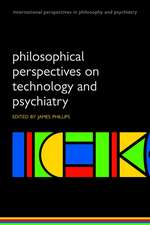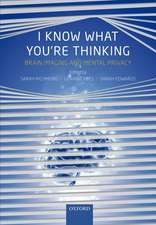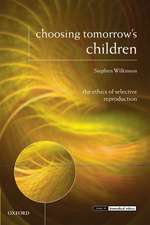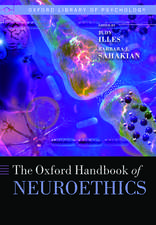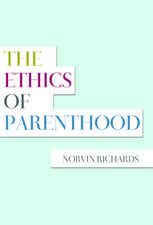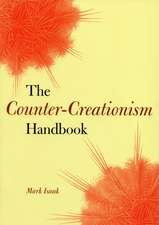Understanding Bioethics and the Law: The Promises and Perils of the Brave New World of Biotechnology
Autor Barry R. Schalleren Limba Engleză Hardback – 29 noi 2007 – vârsta până la 17 ani
Preț: 322.86 lei
Preț vechi: 392.70 lei
-18% Nou
Puncte Express: 484
Preț estimativ în valută:
61.79€ • 67.09$ • 51.90£
61.79€ • 67.09$ • 51.90£
Carte tipărită la comandă
Livrare economică 23 aprilie-07 mai
Preluare comenzi: 021 569.72.76
Specificații
ISBN-13: 9780275999186
ISBN-10: 0275999181
Pagini: 264
Dimensiuni: 156 x 235 x 25 mm
Greutate: 0.56 kg
Editura: Bloomsbury Publishing
Colecția Praeger
Locul publicării:New York, United States
ISBN-10: 0275999181
Pagini: 264
Dimensiuni: 156 x 235 x 25 mm
Greutate: 0.56 kg
Editura: Bloomsbury Publishing
Colecția Praeger
Locul publicării:New York, United States
Notă biografică
Barry R. Schaller is a Connecticut Supreme Court Justice. He is an instructor of trial advocacy at Yale Law School and has recently held visiting lecturer appointments at Trinity College, Wesleyan University, and the University of Connecticut's School of Public Health.
Recenzii
This is an excellent book. After situating bioethics as a discipline within its social context and outlining the ways in which it is threatened by court intervention, Schaller (justice, Connecticut Supreme Court) discusses the legislative and administrative regulation of human subject research..This book is recommended for all with an interest in bioethics. Recommended. Lower-division undergraduate through professional collections.
Standing at the intersection of philosophy, law, science, medicine, and in some cases, theology, bioethics encompasses some of the most troubling questions of the past two decades. Here, Schaller addresses and analyzes in depth a range of bioethical issues: the use of human subjects in scientific research; wrongful birth and wrongful life claims; in vitro fertilization and use of embryos; genetic diagnostic techniques; embryotic stem cell research; organ transplants; and end-of-life issues..Schaller combines a practical sense of how the law works, with a reflective approach to all these contemporary legal and ethical issues.
Justice Schaller presents a unique view of how the court system has to structure and analyze the ethical issues that are presented as legal questions. A thorough examination of the limitations of the court system is presented for the reader who is new to the analysis of ethical issues by the courts. By presenting background on the limitations of litigation with regards to biotechnology and the analysis of ethical issues that are presented as legal questions, Just Schaller is able to challenge the reader to determine if the court system really is the best way to establish policy with regards to bioethics. This book would be beneficial to anyone who has an interest in policy making in the field of public health and biotechnology.
The law moves in ways that are mysterious to many. Both these fascinating books, although dealing with different jurisdictions and issues, contribute to our understanding of the most important ethical challenges that lawyers will face in the coming decades. (reviewed with Easeful Death: Is There a Case for Assisted Dying? OUP)
For the practicing attorney, it is a good guide on the rold of law in the bioethical field and of the possible undesirable outcomes. [.] The book is well written and the issues are well developed. Although Justice Schaller approaches some of the issues from a philosophical standpoint, the problems and the needs are real, and judges and lawyers who find themselves in the thicket will benefit from the guidance which this book provides.
Judge Schaller's book is prodigious in the questions it raises and analyzes. For all the complexity of the subject, the work in a readable fashion introduces lawyers, as well as the educated public, to how legal institutions grapple with bioethicalchallenges in ways that avoid harm (to persons and the advance of science), respect individual autonomy, and maybe even do some good. As a reference manual to the bioethical questions that have been most significant in the last half of the twentieth century and the beginning of the current one, Judge Schaller's book is first rate.
Standing at the intersection of philosophy, law, science, medicine, and in some cases, theology, bioethics encompasses some of the most troubling questions of the past two decades. Here, Schaller addresses and analyzes in depth a range of bioethical issues: the use of human subjects in scientific research; wrongful birth and wrongful life claims; in vitro fertilization and use of embryos; genetic diagnostic techniques; embryotic stem cell research; organ transplants; and end-of-life issues..Schaller combines a practical sense of how the law works, with a reflective approach to all these contemporary legal and ethical issues.
Justice Schaller presents a unique view of how the court system has to structure and analyze the ethical issues that are presented as legal questions. A thorough examination of the limitations of the court system is presented for the reader who is new to the analysis of ethical issues by the courts. By presenting background on the limitations of litigation with regards to biotechnology and the analysis of ethical issues that are presented as legal questions, Just Schaller is able to challenge the reader to determine if the court system really is the best way to establish policy with regards to bioethics. This book would be beneficial to anyone who has an interest in policy making in the field of public health and biotechnology.
The law moves in ways that are mysterious to many. Both these fascinating books, although dealing with different jurisdictions and issues, contribute to our understanding of the most important ethical challenges that lawyers will face in the coming decades. (reviewed with Easeful Death: Is There a Case for Assisted Dying? OUP)
For the practicing attorney, it is a good guide on the rold of law in the bioethical field and of the possible undesirable outcomes. [.] The book is well written and the issues are well developed. Although Justice Schaller approaches some of the issues from a philosophical standpoint, the problems and the needs are real, and judges and lawyers who find themselves in the thicket will benefit from the guidance which this book provides.
Judge Schaller's book is prodigious in the questions it raises and analyzes. For all the complexity of the subject, the work in a readable fashion introduces lawyers, as well as the educated public, to how legal institutions grapple with bioethicalchallenges in ways that avoid harm (to persons and the advance of science), respect individual autonomy, and maybe even do some good. As a reference manual to the bioethical questions that have been most significant in the last half of the twentieth century and the beginning of the current one, Judge Schaller's book is first rate.
